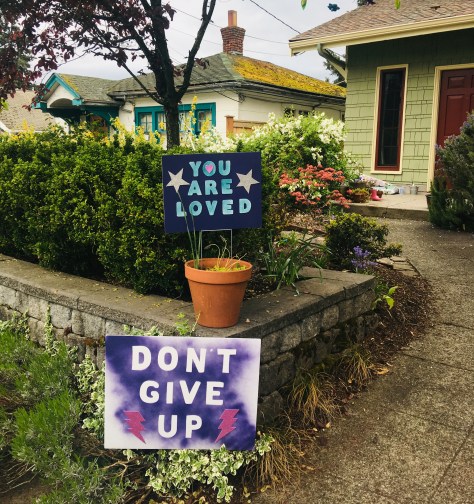Written by Emily Turner
There’s a sentence that’s been haunting me lately: “museums are places where people go to think and feel about what it means to be human”(1). It’s a beautiful concept that encompasses the good and the ugly of what museums have been, what they are, and what they could be. It expresses the potential for museums to assert definitions of humanity that are liberatory, healing, and affirmative while leaving room for the essential question “but for who?”
What is our role and responsibility to help people think and feel about what it means to be human in this moment? What does it even mean to be human in this moment? What does it mean to be essential or vulnerable? What does it mean to survive? Who will? I keep thinking about what our actions – as neighbors, colleagues, and culture workers – communicate about what we think it means to be human right now. As to be expected, the impacts of the virus are not being felt equally. Essential workers are still largely low wage workers; access to health care is still restricted and costly; educators are still trying to meet students’ needs with too few resources; the elderly are still disposable; it’s still expensive to be poor. The systems that prop up what “normal” looks like are still pushing folks to the margins.
As the few museum staff left try to creatively adapt to serve the needs of their community, they ultimately express what they think those needs are and what they believe is the museum’s unique position to fill them. What people will be comforted by, what will help them navigate their day, what will help them make sense of their emotions or the news will depend drastically on how the pandemic is affecting their material reality. Content designed for people who are bored is probably not going to resonate (at least not in the same way) with people still riding the bus every day to work or whose loved ones lie in a hospital bed they cannot visit.
Yes, people are looking for history that affirms a sense of self, distractions, or art as a therapeutic process. People are also looking for more mundane balms – to hear someone express a similar feeling, to speak aloud, to know their child is occupied for thirty minutes. People are also in crisis.
Ruminating on life in the pandemic has been a continuous exercise in getting absorbed in and extracting myself from my own isolation, emotions, hardship, and drama. I’ve been generally disappointed with museum leaders (individuals and institutions) who are unable to pull themselves out of their own internal turmoil, who seem unable to instinctually care for others in a time of crisis. You know, the ones who assume their priorities are the top priority, that whatever choices they make will be justified as long as they can save the institution, that if people know just how long and hard these decisions were they will understand them and feel okay. It can feel like asking the world for what in reality is so little – for those who hold the power to consider our experience and let it impact their choices. To take time to listen, or communicate frequently even if incompletely. To put others’ needs before their own or the needs of the institution. As I try to articulate and find examples of the leadership I am looking for within myself, my institution, and my community this is what I’m getting stuck on. Whose humanity is being affirmed through our choices and in the ways we reach out?
- Marc O’Neill in Gaynor Kavanaugh’s Dream Spaces: Memory and the Museum. Leicester University Press, 2000.

About the Author
EMILY TURNER: Seattle-based museum educator and creative historian who strives to infuse joy and creativity into the museum experience and encourages visitors of all ages to think critically about objects and their stories. Through writing and comix, Emily explores issues of representation and labor in art and history museums. An officer for the Museum Educators of Puget Sound, she is active in her community as a mentor and an advocate for emerging museum professionals.


What a beautiful reflection, Emily. Thank you for posting it here. It hints at the hope — alternately tentative and thriving — that we will emerge from this with new commitment to living in solidarity with all humans.
Thank you! It’s hard to sustain but I really do hope so
I was really taken off guard by the title and the (searching for words) poignantly written message. Thank you for just asking this basic question that in 2020 begs an answer. Just thank you! Ruth
Thank you for taking the time to read and share your thoughts 🙂
Hi Emily, thanks for sharing your thoughts! I’d be interested to hear what you’d like to see museums look like in three or five years; the New England Museum Association is doing a futurecasting themed journal for our summer issue, and as one of the editors I’d be happy to see a submission from you! The details are here: https://nemanet.org/resources/publications/new-england-museums-now/cfs/#theme
Thanks for the heads up! It looks like a really fun prompt 🙂